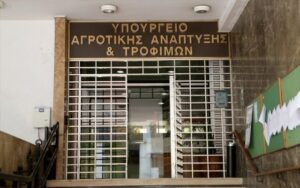Hello! I’ll start with a “topic” that caught my attention a couple of days ago, making the rounds on social media — the logo of the Thessaloniki Metro, set to be inaugurated on the 30th of the month. The internet went wild, with fierce criticism about the logo — “It looks awful,” “They made it resemble an ‘M’ for Mitsotakis instead of Metro,” “There was no public competition” (so a 30-thousand-euro bribe for a project worth several billion, if you ask me), etc., etc. You might recall what Clint Eastwood said in the legendary line from Inspector Callahan: “Opinions are like… [you know what], everyone has one.” Indeed, we’re now just days away from Thessaloniki finally having a metro, yet we’re debating its logo. For a project first proposed in 1918, officially budgeted in 1976, with its first hole (which was never used) dug in 1987, and the actual tender launched in 1992 (I’m not even mentioning SYRIZA’s ceremonial tarp unveiling in December 2018). But hey, what can I say? People write and comment on whatever they want, and everyone has an opinion on everything. What matters is the result, and the result is that Thessaloniki will finally have a metro now, even though it should have had it decades ago, a fact that doesn’t absolve the bipartisan system that has ruled us for so many years.
Trump and Erdoğan
Remember when Alexis [Tsipras] met Trump and said, “Trump’s ways may seem devilish, but they’re done for a good cause”? Well, something similar applies now with the appointments made by the new President of the USA. While some in Athens were not exactly fans of Trump, his choices in foreign policy have led a few people to… celebrate (let’s hope not prematurely). From the neoclassical building on Vasilissis Sofias Avenue, I’ve been told that the new faces either politically oppose Erdoğan (like Marco Rubio, the new Secretary of State) or have a cultural divide with Islamism (Mike Waltz and Tulsi Gabbard). In other words, while Erdoğan might hope for a transactional relationship with Trump on a personal level, it won’t be that easy in practice.
Kushner’s “Key” Role
Sticking to American matters, my source at the Ministry of Foreign Affairs explained that Trump’s son-in-law, Jared Kushner, will play a crucial role in decision-making. While not officially part of the government, he’s “in the ear” of the new President. Kushner, being Jewish, has strong ties with the Netanyahu government. “We have access to Kushner and a reliable relationship with the Israelis,” my source told me, adding that currently, Turkey-Israel relations are at a low point again.
Papadopoulou’s Trip
In this context, Deputy Foreign Minister Alexandra Papadopoulou will travel to Washington in the coming days. It’s a scheduled trip related to necessary contacts for assuming duties at the UN Security Council in the new year, but it’s obvious she will also “take the temperature” of the new situation. She might even meet some key figures who will play a role in the new scene.
SYRIZA in the Freezer
It’s evident that the media is focusing on Kassel. What might not be so evident is that the remaining SYRIZA members have elections in 10 days and are currently not invited to any prime-time news broadcasts. The channels say, “Should we invite Farantouris or Famellos? But also Polakis or Gkletsos?” Perhaps OPEN will make an exception, and of course, the ERT debate is coming up. However, I can’t help but notice that these days, the candidates for the PASOK presidency were already booking their appearances for the grand finale of the last week.
Eurobank Lawsuit Against Mantonanakis (Episode No. 17,125)
I’m not sure whether the infamous negotiations between the State and the hotel magnate Pantelis Mantonanakis are still ongoing or where they currently stand. Mantonanakis, whom this column has dubbed the “Post-Junta Businessman,” owes approximately 350 million euros to banks but managed to get the state to owe him 750 million euros, with the government practically begging him to settle. Nonetheless, it seems the legal battles with the banks continue. Although belatedly reported, Eurobank filed another lawsuit on May 30, 2024, this time at the Multi-Member Court of First Instance of Lasithi against the company “Helios S.A.” The lawsuit demands: Recognition of the nullity or invalidity of the decision from the Extraordinary Self-Convened General Assembly of shareholders of “Helios S.A.” on January 25, 2024, which had as its sole agenda item the “Decision on share capital increase and amendment of Article 5 of the Articles of Association.” Recognition that the plaintiff retains a pledge right on the shares representing 100% of the company’s capital, with a right to participate and vote at the General Assembly of shareholders. Additionally, the company is to be ordered to refrain from any future actions that would disrupt the pledge right, including the right to call, participate, and vote in the General Assembly.
It also asks for a financial penalty of 100,000 euros and one-year personal detention for each of the second, third, and fourth defendants for any future violation of this obligation and for the ruling to be declared temporarily enforceable.
The lawsuit targets not only the company itself but also its board members, where Pantelis Mantonanakis is President and CEO, and Anna Mantonanakis is Vice President and Managing Director. During that contentious General Assembly on January 25, 2024, a share capital increase of 180,000 euros was decided with cash payment. Concurrently, the nominal value of shares was adjusted from 1 euro to 4 euros each. As a result, the company’s share capital is now 17,135,500 euros, divided into 4,283,875 registered shares with a nominal value of 4 euros each. By mid-February, the payment of 180,000 euros was confirmed. All these maneuvers that quadrupled the share capital instantly have triggered a chain of consequences, drawing Eurobank’s attention.
“I Smell” More Lawsuits…
Just yesterday, I learned of further developments regarding the share capital of “Attikos Helios,” which manages the prime asset of Grand Resort Lagonissi. We’re talking about a “stretchy” share capital. For example, in June 2023, a capital increase of 1,047,000 euros was carried out, with the nominal share value changing from 1 euro to 100 euros each. Another increase of 850,000 euros followed in December 2023, lowering the nominal value from 100 euros to 10 euros per share. The latest news indicates that on October 29, 2024, the Extraordinary General Assembly decided to increase the share capital by 990,000 euros, issuing 99,000 common shares with a nominal value of 10 euros each, paid in cash. Simultaneously, the nominal value of common shares was adjusted from 10 euros to 50 euros per share. Further, the same assembly increased the capital by 220,000 euros by issuing 22,000 registered, non-transferable, redeemable preferred shares without voting rights, each with a nominal value of 10 euros, labeled as “Series 1.” Consequently, “Attikos Helios” now has a share capital of 75,203,100 euros, divided as follows: a) 1,499,662 registered common shares with a nominal value of 50 euros each, and b) 22,000 registered, non-transferable, redeemable preferred shares without voting rights, each valued at 10 euros, labeled as “Series 1.”
OTE-NOVA Deal on Sports Channels Attracts Subscribers
The commercial deal between OTE and NOVA last summer, involving mutual access to their sports channels on their TV platforms, has proven highly successful. Yesterday, Kostas Nebis reported to analysts that OTE achieved a record in TV subscriber additions, reaching a total of 710,000 subscribers, up from 686,000 at the end of last June. He predicted continued growth in the coming quarters as the Greek market lags behind the European average in pay TV penetration. New legislative initiatives to curb piracy in subscription TV are also expected to boost this trend, with revenue impacts starting in December.
Additionally, a pre-announced move was executed yesterday, involving the spin-off of the mobile passive infrastructure sector and the creation of a new company. Essentially, OTE is establishing a new 100% subsidiary (a TowerCo), which will take over part of the mobile phone stations’ passive equipment (the antenna infrastructure). This mirrors the actions of other companies, including OTE’s parent company, Telekom Group. When asked whether other shareholders might be introduced in the future, the management tactfully avoided answering, leaving open the possibility of selling the company, as has been done by other telecoms recently.
It was also noted that in early 2025, fees for fiber optic connections of 100 Mbps and higher will be reduced, which is eagerly anticipated by OTE and other providers. However, yesterday OTE’s stock didn’t have a great day, ending the session down by 3%, as analysts are waiting to see the impact of the management’s new initiatives in the coming quarters.
Double Capital Increase at LAMDA Malls
A wave of capital increases is taking place in LAMDA’s mall-related companies, in preparation for the upcoming mega shopping spaces expected to be completed by 2027 within the Ellinikon project. This move is part of organizing the group’s activities related to its six shopping centers (four existing ones and two new developments at Ellinikon). According to the General Electronic Commercial Registry (GEMI), an Extraordinary General Meeting of the shareholders of “LAMDA Ellinikon Malls Holding S.M.S.A.” on November 8 decided on a capital increase of up to 97.3 million euros. This was achieved through the issuance of 973,000 new common registered shares, each with a nominal value of 100 euros, raising the company’s total share capital to 406.7 million euros. A similar decision was made a day earlier, on November 7, by the shareholders of “LAMDA Malls S.A.,” approving a capital increase of up to 61 million euros through cash contributions. This increase involved issuing up to 61 million new shares, bringing the company’s total capital to 552.63 million euros. The group is making strategic moves as it is currently negotiating with banks and is expected to secure funding soon for the development of commercial spaces at Ellinikon, specifically the “The Ellinikon Mall” on Vouliagmenis Avenue and the “Riviera Galleria” at the marina. The LAMDA management has stated that so far, the project has been self-financed, and the malls will be the only developments receiving bank financing.
Party at Domiki Kritis
Following the announcement by Domiki Kritis that its Board Chairman Dimitris Koutras was systematically purchasing company shares (approximately 20,000 in total), a mini stock market rally was triggered, not only for Domiki Kritis but also for the related stock of EKTER. Three days ago, Domiki Kritis’ share price surged by 6%, followed by a 4.9% rise the day before yesterday, and yesterday it climbed above 3 euros with a 6.81% increase. Coincidentally (or not?), EKTER’s stock also jumped, recording a 7% rise yesterday and 4% the day before. Domiki Kritis’ market value rose to 6.8 million euros, while EKTER’s capitalization reached 35 million euros. EKTER has called an Extraordinary General Meeting of its shareholders for November 25. In the previous meeting held on November 11, only 39.2% of shareholders were present, thus failing to meet the increased quorum requirement set by the management (50% of the paid-in capital), and a repeat meeting was scheduled for November 25.
Clear Dividend Outlook for PPC
CEO Giorgos Stassis outlined the dividend policy of the Public Power Corporation (PPC) with precise detail until 2027. He presented to analysts a clear investment plan worth 10 billion euros, indicating that PPC’s annual capital expenditures will exceed 3 billion euros. The ratio of operating profit (EBITDA) to debt will be maintained at 1:3.5, and Stassis clarified that there are no plans for further acquisitions at the moment. The management aims to achieve operating profits (EBITDA) exceeding 2.7 billion euros by 2027 and over 3 billion euros by 2030. The third-quarter financial statements recorded extraordinary losses of 140 million euros from old Power Purchase Agreements (PTAs), but adjusted profitability is around 350 million euros. These factors result in a 41% annual growth rate (CAGR) in dividend payments, the highest among European energy companies. The target is to increase the dividend from 0.25 euros per share for the 2023 financial year to 1 euro per share by 2027. Once on the brink of collapse, PPC is now valued at 4.7 billion euros, a 20% increase from this time last year.
The Stock Exchange and Road Shows (by JP Morgan and Morgan Stanley)
Yesterday marked the second consecutive day of correction on the Stock Exchange, with minor losses as the General Index settled at 1,417 points (-0.18%), and transaction value reached 142 million euros, including 21.6 million in block trades. Today, 2,320 General Index Futures contracts will expire on the Derivatives Exchange. Banks, once again, are bearing the brunt of their own success as those profiting from stock gains liquidate their assets to bolster their funds. The market eagerly awaits the 650 million euros expected from the public offer of GEK TERNA. Out of this amount, about 120 million euros will be collected by Greek institutional investors, enabling them to reinvest without liquidity concerns. The assets under management of Mutual Funds in Greece surpassed 21.2 billion euros, with Greek savers purchasing 68.3 million euros worth of fund shares last week. In anticipation of fresh investment inflows from abroad, the Greek market continues recycling its funds by selling profitable shares and investing in promising companies. There is optimism for the upcoming major London roadshows: one by JP Morgan on November 21-22 and another by Morgan Stanley on December 2-3. Positive sentiment was expressed for oil stocks like Motor Oil and HelleniQ Energy ahead of the Competition Commission’s report, while TITAN, up by 3.68% to 35.2 euros, is enjoying its own American Dream. Notably, the stock of the Piraeus Port Authority (PPA) has soared to historic highs, driven by strong passenger and cargo traffic, along with a persistent buyer who seems to have high hopes. ALUMIL’s stock saw an impressive rise of 5.44% to 3.58 euros, as it restructures its balance sheet with the help of banks and expands into international markets, justifying its market capitalization of 116.2 million euros.
Rebellion in Thessaloniki
A stir occurred the day before yesterday in Sindos, Thessaloniki, as local MP Stratos Simopoulos (New Democracy, A’ Thessaloniki) called for a legislative change to amend the operational regulations of Business Parks (BIPs), claiming they contain abusive provisions. The event was organized by an association of businesses located in the Thessaloniki Industrial Area, representing fewer than 90 out of 560 operational companies. There were loud complaints regarding the charges for water supply, sewage services, and security. It is true that the BIP company has cleaned up the financial statements of the Thessaloniki Industrial Area, setting a unified pricing policy based on plot size and water consumption. Additionally, security has been enhanced with four patrols at night and one during the day. It’s also a fact that many small businesses had become accustomed to using the facilities without paying rent, based on an old 2011 law. Thessaloniki’s Industrial Area is the largest in the country and the Balkans, spanning 12,500 acres and hosting 750 companies, of which 560 are active, contributing approximately 3% of the country’s GDP.
Germany Changes Tune
More than 100 days remain until Germany’s anticipated early elections, likely signaling a return of the Christian Democrats to the Chancellery. Germany, now in its second consecutive year of negative growth, is beginning to reconsider its stance on the strict fiscal rules. Christian Democratic leader Friedrich Merz has, for the first time, opened the discussion on revising the Constitutional Rule regarding the “debt brake.” The chancellor candidate mentioned the possibility of altering Germany’s strict borrowing limits (debt brake) if the additional debt-financed expenditures are used for investments. “Of course, it can be reformed,” Merz stated at a business conference organized by the newspaper Süddeutsche Zeitung. “The question is why and for what purpose.” Co-chair of the Social Democrats Saskia Esken immediately seized the opportunity, stating that discussions on a debt brake reform could even begin during the current parliamentary session.
Ask me anything
Explore related questions





